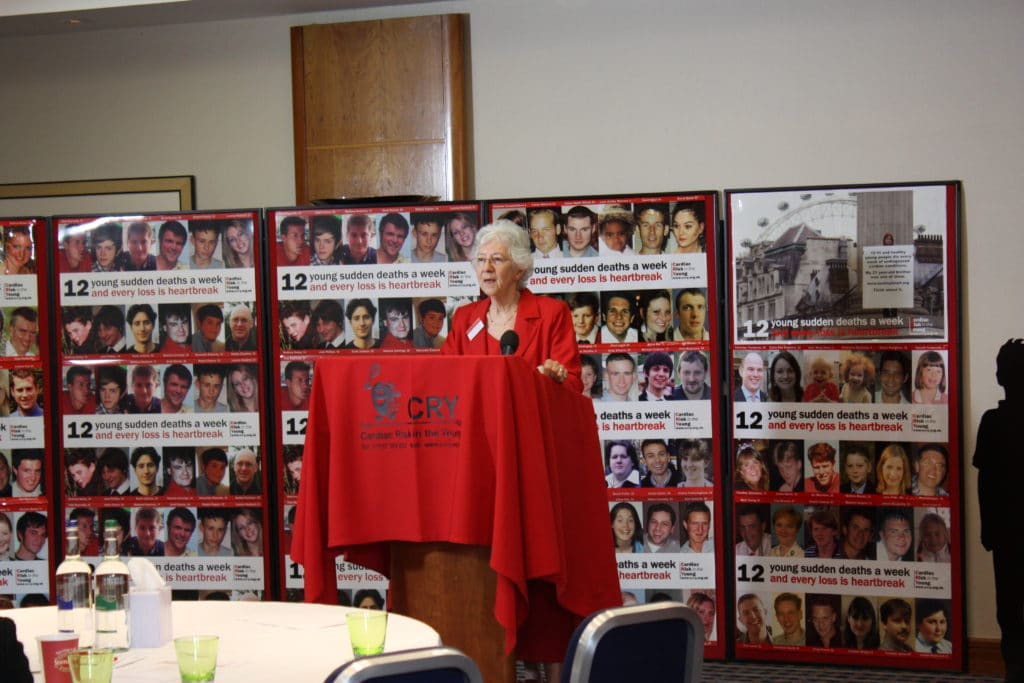First launched in 2004 (then revived almost five years later) CRY’s iconic postcard campaign marked a turning point in the evolution of the charity. The initiative helped take CRY from a reactive organisation with raising awareness and specialist bereavement support at its heart, to a lobbying organisation where political impact and meaningful engagement with MPs mattered.
The powerful campaign – which, over the course of a decade, saw more than 170,000 postcards sent to serving MPs, triggered by 24 regional launches – was a simple yet highly effective means of paying tribute to the young faces behind the tragedy of a young sudden cardiac death.
It was inspired by a conversation between CRY Founder Alison Cox MBE and MP for North Durham, Kevan Jones, who felt that the those affected by the devastation of a young sudden cardiac death should be given a voice and invited to bravely ‘front’ an national awareness initaitive.
In fact, Kevan (who first became involved with CRY following the sudden death of the teenage son of his friend, local Durham man Jeff Morland) remains a pivotal part of CRY to this day, often hosting the annual Parliamentary Reception and standing as Chair of the All-Party Parliamentary Group (APPG).
So, two years later, in July 2004, when the charity felt the time was right, the original design was first unveiled to families, MPs and the media at a moving event held at the House of Commons. It featured photos of 8 young people (in the first instance, from across the Midlands) who had died suddenly from a previously undiagnosed heart condition.
The nationwide ‘tour’ gathered momentum and huge support, spreading the word about the scale and impact of these young deaths.
Then, following on from this successful first phase (with Alison and the CRY team travelling from Swansea to Surrey, and Edinburgh to Exeter), the postcard was re-launched in 2008. It represented a shocking, new, ‘corrected’ statistic that in fact 12 young, apparently fit and healthy people were tragically dying every week in the UK from young sudden cardiac death – a stat that could no longer be ignored.

Speaking at the London launch of the new postcard project, Alison Cox MBE said; “These 12 faces are just a snap-shot of the problem and we need to keep up the pressure and engage support from as many MPs as possible to ensure we are doing everything we can to prevent other families from experiencing similar tragedies.
“We already have great support from MPs, many of whom have been deeply moved by a death of a young person in their constituency. They have pledged to encourage us in our ongoing work and awareness raising activity.
“However, we are confident that this updated postcard will help us target those MPs who are not yet aware of our commitment to preventing further needless deaths and encourage them to become involved with us as we embark on our next phase of awareness and campaigning.
“I’m also extremely grateful to all of our families who have agreed to lend their support to this very powerful and valuable campaign.”
At the time, the core purpose of the postcard campaign (which came to a close in May 2014) was to encourage MPs to simply acknowledge and add their support to CRY’s work, ideally by joining the Cardiac Risk in the Young All-Party Parliamentary Group.
Now, another 5 years on and 10 years since the postcard was first introduced at Westminster, CRY’s campaigning profile has taken a new direction, set against the backdrop of the charity’s ongoing ‘crusade’ against the repeated decisions of the National Screening Committee to NOT recommend population screening for sudden cardiac death in the young.
CRY continues to represent the voice of bereaved families. But now, paper and postcards have been replaced by strategic social media initiatives and the successful and engaging #MPs4CRY pledge, which has already garnered the backing of over 140 MPs, signing up to support a National Strategy for the Prevention of Young Sudden Cardiac Death to help save young lives.
CRY’s Chief Executive, Dr Steven Cox, concludes; “The CRY Postcard campaign was first launched almost 15 years ago and as we take a look back over our many milestones and highlights, I believe it really remains the bedrock of much of our political and campaigning activity today.
“Our 25th anniversary may not have panned out quite as we’d planned, particularly during 2020 but what it has given us is an unexpected time of reflection as well as looking to the future. CRY may have grown, and social media expanded our reach and influence beyond expectations, but it’s still important to remember those important campaigns that first put us on the political radar. And who knows, maybe one day the postcard campaign will make a comeback…”




